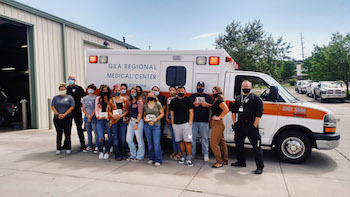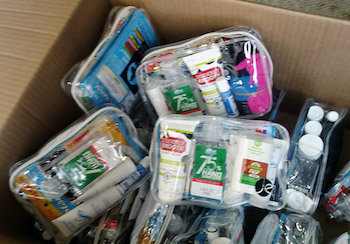 Community Health workers students visited Gila Regional Medical Center’s Emergency Medical Services to donate COVID Care Packs.Tuesday, September 1, 2020; Silver City, NM: Recently High School students enrolled in the Community Health Workers (CHW) certification program delivered COVID Care Packs to first responders at Gila Regional Medical Center’s (GRMC) Emergency Medical Services (EMS).
Community Health workers students visited Gila Regional Medical Center’s Emergency Medical Services to donate COVID Care Packs.Tuesday, September 1, 2020; Silver City, NM: Recently High School students enrolled in the Community Health Workers (CHW) certification program delivered COVID Care Packs to first responders at Gila Regional Medical Center’s (GRMC) Emergency Medical Services (EMS).
Silver High School Senior, Jamie Flores said creating the COVID Care Packs was a “simple and fun community service project.”
 The COVID Care Packs included hygiene items like masks and hand sanitizer for needy individuals to utilize during the pandemic.“The students are required to complete 80 hours of community service to receive their certification,” educator Kalah Carrasco said. “Due to COVID-19, we’ve had to be innovative on how to complete the requirements for the safety of our students and the community.”
The COVID Care Packs included hygiene items like masks and hand sanitizer for needy individuals to utilize during the pandemic.“The students are required to complete 80 hours of community service to receive their certification,” educator Kalah Carrasco said. “Due to COVID-19, we’ve had to be innovative on how to complete the requirements for the safety of our students and the community.”
The COVID Care Packs contain hygiene items like masks, hand sanitizer, toothbrush, toothpaste, mouthwash, deodorant, lip balm, lotion, shampoo and conditioner. The packs also included food items like tuna and granola bars. GRMC EMS will distribute the packs to needy individuals they come in contact with during their response efforts.
“EMS answers anywhere from 50 to 100 calls a week, and daily we come into contact with homeless individuals that will benefit from receiving these packs,” GRMC EMS coordinator Briena Avila said.
“These bags will get resources to people that might not have it available and protect everyone for the community to feel safer.” Such efforts to promote and contribute to community health are why the CHW certification program is offered.
The CHW program was initially offered through Silver Schools and made possible by the New Mexico Public Education Department’s Next Gen CTE (new career technical education) Gant The funds goal is to provide high school students the opportunity to enroll in career technical education. FNM AHEC funded the additional summer semester required for the CHW students to complete the certification program. Western New Mexico University (WNMU) partnered in, as well, to offer the college-credit courses.
WNMU Associate Professor Benjamin Jenkins, PhD, CRC, explains why the institution took part, “The idea is to get students interested early in the health care profession, and the CHW curriculum serves as a great gateway for young people to enter the field.”
Students enrolled in the CHW certification program receive six college credit hours and a chance to broaden their perspectives on health care professions they might be interested in pursuing after high school.
Cliff High School Senior, Augusta Gonzales is interested nursing as a career and thought a CHW certification would help her college prospects, “Through the program I learned there are different paths to get into nursing through education.”
“By participating in the program young people become good examples in their community for healthy lifestyles,” said Jenkins. “The whole purpose behind the program is to promote healthy living within communities, and how better to do that then to promote that lifestyle among our rising generation?”
“Some of these health care certifications and opportunities we are creating are to make health care more accessible to the public, and perhaps, decentralize health care to diffuse it into the community,” Jenkins added.
Silver High School Senior, Maya Trujillo joined the class uncertain of her future career, “but once I was in the CHW program, I saw how broad of a field health care is, and I can help a lot of people - help the community!”
Part of the process for building a stronger health care network to service community includes policies to make CHW services billable through Medicaid, Medicare and private health insurances.
“CHWs can be an important part of preventative, after and recovery care, accessing resources, raise awareness and educating community on public health issues,” said Carrasco.
Though the CHW certification program is currently being offered in area high schools, Jenkins said, “We do plan to continue to develop this model for educating young people, and we hoping to develop additional certificate programs beyond CHWs. Be on lookout for that!”
For more information on the CHW program contact Bala Salgado at (575) 597-0030 or bsalgado@chi-phi.org.
For more information contact CHI at (575) 597-0030 or bsalgado@chi-phi.org.